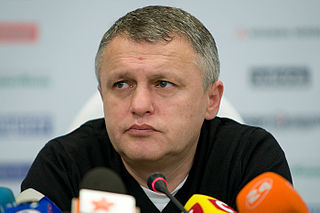
Ihor Mikhaylovich Surkis is a Ukrainian oligarch best known for being an owner and President of Dynamo Kyiv since 2002. His brother, Hryhoriy Surkis, was the head of the Football Federation of Ukraine from August 2000 to September 2012.
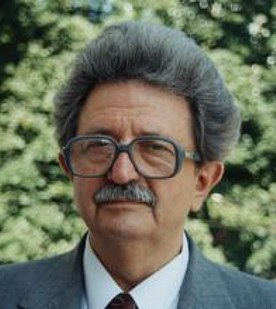
Mykhailo Mykolayovych Horyn was a Ukrainian human rights activist, Soviet dissident, and politician. He was a People's Deputy of Ukraine in the first convocation of the Verkhovna Rada, from 15 May 1990 to 10 May 1994. He played an important role in the country's struggle for independence.
Ivan Gel was a Ukrainian politician and dissident. He was a member of the Ukrainian Helsinki Group and the Ukrainian Christian Democratic Party.
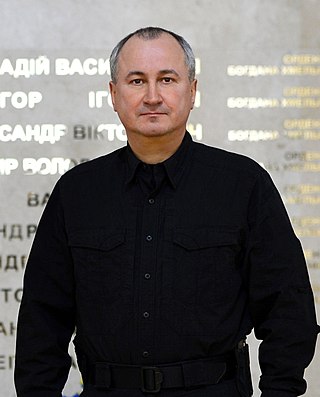
Vasyl Serhiiovych Hrytsak is a Ukrainian serviceman, army general, and the fourteenth head of the Security Service of Ukraine. Founder and chairman of the supervisory board of the Ukrainian Center for Analytics and Security. Head of the Security Service of Ukraine (2015–2019). Member of the National Security and Defense Council (2015–2019). General of the Army of Ukraine.
Anatoly A. Mazaraki is Ukrainian scientist of Greek descent, rector of the Kyiv National University of Trade and Economics (KNUTE). Among his academic achievements belong: the Doctor of Economics (1995), professor (1994), academician of the Academy of Pedagogical Sciences of Ukraine, Honored Scientist of Ukraine (1995) and Honorary Professor (2010). He is author of over 300 scientific publications.
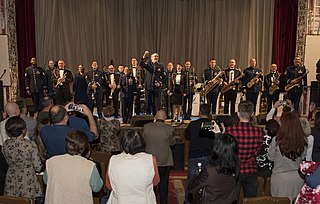
The National Presidential Band of Ukraine is a Ukrainian military brass band of state that serves as the official musical ensemble of the President of Ukraine.

Vasyl Ivanovych Folvarochnyi was a Ukrainian novelist, poet and journalist. He was a Merited Figure of Arts of Ukraine.
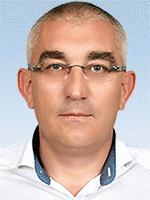
Ivan Chaikivskyi is a Ukrainian businessman and politician. He was conferred the "For Work and Victory" (2008) medal. Knight of the "Order of Merit" III degree (2012). He served as a People's Deputy of Ukraine of the 9th convocation. He was a member of the deputy group "For the Future".
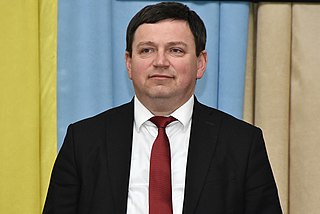
Bohdan Buiak or Bohdan Buyak is a Ukrainian educator, public figure, political scientist, doctor of philosophy (2013), professor (2013), correspondent member of the National Academy of Pedagogical Sciences of Ukraine (2019). Honored Worker of Education of Ukraine (2020).
Hryhorii Vasylovych Tereshchuk is a Ukrainian educator, doctor of pedagogical sciences (1995), professor (1996), and corresponding member of the National Academy of Pedagogical Sciences of Ukraine (2003).

Yurii Patsan is a Ukrainian artist. Knight of the "Order of Merit" of the III degree (2008), Honored Artist of Ukraine since (2014).
Ihor Volodymyrovych Bedzai was a Ukrainian naval officer and pilot killed when his plane was shot down by invading Russian forces during the Russian invasion of Ukraine. He was a posthumously awarded the title of Hero of Ukraine as a recipient of the Order of the Gold Star, and the Order of Bohdan Khmelnytsky III class.

Vitalii Yukhymovych Malakhov was a Ukrainian theatre director and artistic manager-director of the Kyiv Drama Theater on Podil. He was nominated as the People's Artist of Ukraine in 2008. He was also the laureate of the Shevchenko National Prize in the field of art in 2008.
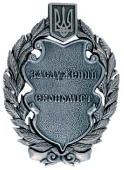
The Honored Economist is an honorary title of Ukraine, awarded for personal merits to the Ukrainian state to citizens who worked in a relevant branch of the economy or socio-cultural sphere, as a rule, for at least ten years, have high work achievements and professional skill.

The Decorations of the President of Ukraine for Humanitarian Participation in the Anti-Terrorist Operation is the state award of Ukraine and was established by the President of Ukraine to honor those who deserve recognition for their contributions to counterterrorism operations in the Donetsk and Luhansk oblasts, including employees of businesses, institutions, and organizations, as well as other individuals who actively participated in such operations or voluntarily ensured their successful execution.

Rostyslav Pavlovych Lazarenko is a Ukrainian military pilot (podpolkovnik) of the Ukrainian Air Force of the Armed Forces of Ukraine, participant in the Russo-Ukrainian war. Hero of Ukraine (2023).

Anatoliy Savvatiyovych Pushnyakov was a Ukrainian military officer of the rank of Lieutenant General. He served as the Deputy Commander of the Western Operational Command, commander of the Ukrainian peacekeeping contingent, at the same time the deputy commander of the multinational division "Center South" in Iraq. From 6 May 2014 to 13 January 2016, he served as Commander of the Ukrainian Ground Forces.
Oleksandr Serhiiovych Pivnenko is a Ukrainian athlete, serviceman, Brigadier general of the National Guard of Ukraine, a participant in the Russian-Ukrainian war. Commander of the National Guard of Ukraine, member of the Supreme Commander-in-Chief's Staff. Hero of Ukraine (2023).
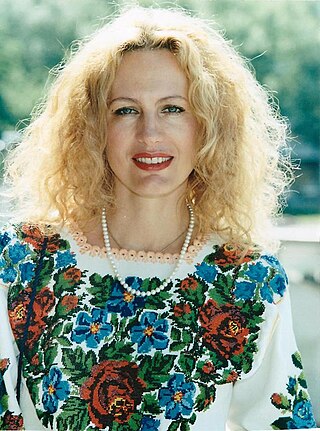
Lyudmyla Pylypivna Yefymenko is a Ukrainian film actress and film director. She is recipient of the awards Merited Artist of Ukraine, People's Artist of Ukraine and Order of Princess Olga.

Roman Anatoliiovych Darmohrai is a Ukrainian soldier, Pidpolkovnyk of the 72nd Mechanized Brigade of the Armed Forces of Ukraine, a participant in the Russian-Ukrainian war.


















